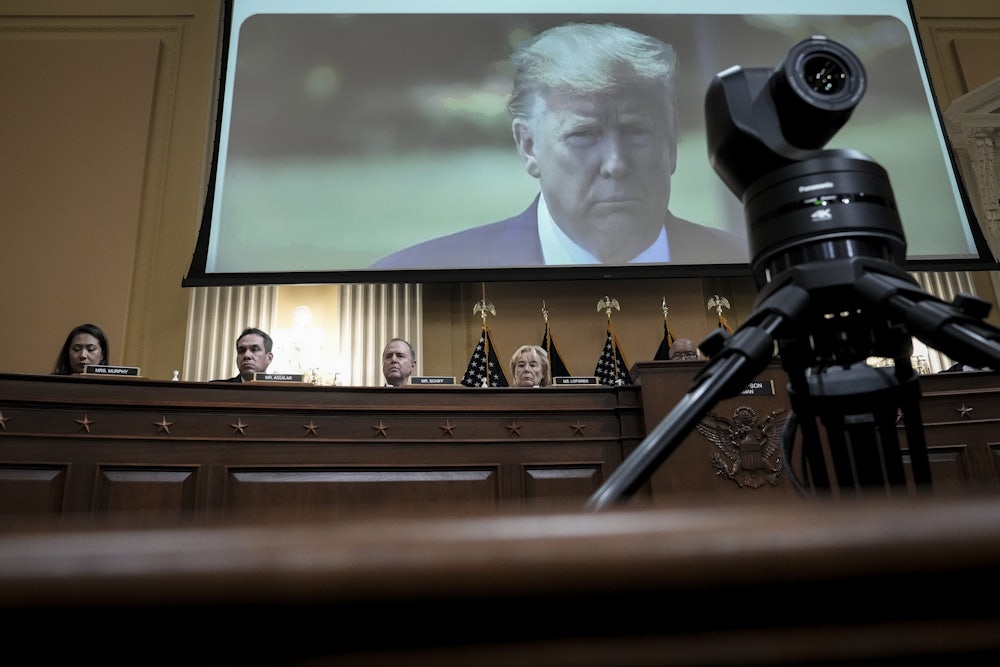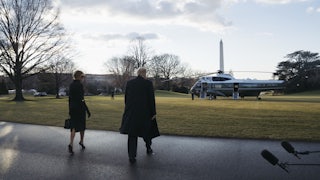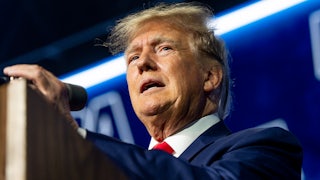Up to now, the 1973 Senate Watergate hearings have been rightly invoked as the gold standard for congressional investigations. But despite the historical prominence those hearings have gained as the decades have passed, Congress’s Watergate efforts started out as a sleepy affair. The early hearings proceeded at the leisurely pace of the afternoon soap operas that they preempted on the broadcast networks. After the first day of the hearings in May 1973, Jules Witcover began his Page 1 Washington Post story by noting wryly, “If you like to watch grass grow, you would have loved the opening of the Senate select committee’s hearing on … Watergate.”
No one could write the same review for Thursday night’s kickoff of the January 6 select committee. Never in the television age has an entire congressional committee been so united in going for the jugular of a former president. And the cohesive, riveting story it’s promised to tell over the course of the next month might just be enough to break the stalemate that has prevented the country from universally recognizing the horrors that took place when a band of insurrections stormed the Capitol.
The opening session of the January 6 committee outlined a powerful prosecutor’s brief against Donald Trump. As Representative Liz Cheney—ostracized by the Republican Party and in the fight of her life to hold her Wyoming House seat—summarized the essence of the case, “You will hear how President Trump summoned a violent mob and directed them to illegally march on the United States Capitol.”
The hearing was cleverly punctuated with clips from leading Trump figures who testified during the committee’s closed-door investigative sessions and said openly that Trump’s obsessive lies about the outcome of the 2020 election had no basis in fact. Former Attorney General William Barr recalled that he told Trump that charges of a stolen election were “bullshit.” Ivanka Trump (yes, the president’s fawned-over daughter) testified in a pained voice, “I respect Attorney General Barr. So I accepted what he was saying.”
It had become fashionable ahead of the hearing to dismiss the January 6 committee as an exercise in futility, an empty show to appease those who cheered Trump’s impeachment but one that cannot break through the fog of partisanship. The Thursday print edition of The New York Times included a column (“The January 6 Committee Has Already Blown It”) and guest essay (“The Anticlimax of the Jan. 6 Hearings”) preaching the doctrine of hopelessness.
But judging from the initial two-hour session, those predictions could prove misguided. For one, it certainly had a broader array of viewers than just those who follow the news through the silos of cable channels, since the full hearing was broadcast on the three major networks. It was telling that the commentary on ABC News had none of the standard equivocation that defines most television news. Instead, the ABC correspondents and commentators took the testimony seriously without bursting in with a contrary view from a Trump toady. Even Chris Christie, the token Republican talking head, said, “I think the most important thing for the long-term credibility of telling the story tonight was using the words of the people around the president.” And while the die-hard Trumpists are unlikely to be swayed, there is a larger majority still waiting for a reckoning. In a mid-May CBS News poll, 70 percent of Americans said that they consider it “important” to “find out what happened” on January 6.
The successful launch of the hearings came about in part thanks to GOP obstructionism. First, Senate Republicans rejected a bill that would have formed a bipartisan commission. When Speaker Nancy Pelosi decided that the House would forge ahead solo, House Minority Leader Kevin McCarthy named bomb-throwers such as Ohio’s jacketless Jim Jordan as Republican members of the committee. When Pelosi decided to block Jordan and Jim Banks from serving, as is the prerogative of the speaker, McCarthy rescinded the other three GOP members out of pique last summer.
The committee is still bipartisan, with Cheney and Representative Adam Kinzinger on board. But these two Republicans remain the antithesis of the cult of Trump. The result: the first congressional committee in memory on which all nine members are united in the same cause—getting at the truth of the attempted coup of January 6. That meant the narrative was not interrupted by Benghazi-style grandstanding and conspiracy-mongering by scorched-earth Republicans.
That ability to work in lockstep proved decisive for Watergate, offering the most stunning unanticipated revelation in the past 50 years. Former Nixon aide Alexander Butterfield was testifying in a methodical, unemotional voice when Fred Thompson, the minority counsel who later became a Tennessee senator, asked a simple question, “Mr. Butterfield, are you aware of the installation of any listening devices in the White House?” (The moment comes at minute 57:00.) After a momentary pause, Butterfield acknowledged that, yes, he was very much aware since he supervised their installation. Even though the Watergate committee had known about Butterfield’s bombshell for three days, there were no leaks, no hints of what was to come.
While more than 80 percent of Americans said that they watched at least part of the Watergate hearings, the transformation of public opinion about Richard Nixon was gradual rather than immediate. In mid-August 1973—after former Nixon aides, including John Dean, H.R. Haldeman, and John Ehrlichman, had already testified—only 52 percent of Americans in a Gallup Poll thought that the hearings were a “good thing” for America. But the revelation of tapes changed that. Without the White House tapes—which Nixon at times wanted burned—the president probably would have survived to finish out his second term. As Nixon put it in his memoirs, “I had believed that the existence of the White House taping system would never be revealed.”
There have been some early leaks from the January 6 committee, but there were also strong hints during Cheney’s overview that it has its own set of revelations that may match the Butterfield shocker. As Cheney indicated, we will hear firsthand accounts of Trump responding to chants of “Hang Mike Pence” by callously saying, “Maybe our supporters have the right idea.” Cheney claimed that Representative Scott Perry had sought a preemptive pardon after he tried to help Trump purge the Justice Department of people unwilling to follow the Big Lie—and teased that there were other GOP House members yet to be revealed who also wanted last-minute pardons before Trump left the White House.
Already, Thursday night’s hearing underscored the finding that the storming of the Capitol was orchestrated by far-right groups—the Proud Boys and the Oath Keepers, in particular—rather than being a spontaneous bout of mob madness. Watergate fans who remember Bob Woodward having a whispered conversation with Deep Throat in a dark parking garage in the film version of All the President’s Men would have had a jolt of recognition when Nick Quested, a British filmmaker who served as one of the two witnesses on Thursday, testified that the leaders of the Proud Boys and the Oath Keepers met in a Washington parking garage on the night before the January 6, 2021, assault on the Capitol.
The Watergate hearings—which helped bring down a president—ran for 237 hours on daytime network television. The January 6 committee is ditching the prime-time hours next week for daytime hearings that will diminish the audience, though there is the hope that cable networks or PBS might run evening replays. And predictions are risky after just two hours of videos and testimony. But Thursday night’s riveting and focused session raised hopes that these hearings might, just might, be the second time in U.S. history that Congress brings down a dangerous presidential threat to democracy.






